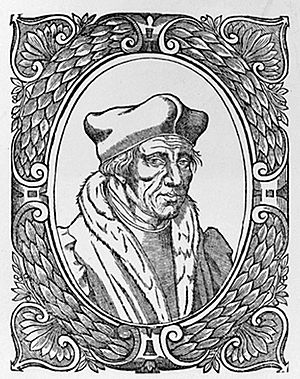Jacques Lefèvre d'Étaples facts for kids
Jacques Lefèvre d'Étaples (born around 1455, died around 1536) was an important French thinker and religious leader. He was a theologian (someone who studies religion) and a key person in French humanism (a movement focused on human values and classical learning). He also helped prepare the way for the Protestant movement in France. The "d'Étaples" part of his name helped tell him apart from another person named Jacques Lefèvre.
Even though he had ideas that were important to the Protestant Reformation, Lefèvre stayed a Roman Catholic his whole life. He wanted to make changes to the Church from the inside, rather than breaking away from it. Some of his books were seen as heretical (against official Church teachings), and he had to live in exile for a while. However, he was a favorite of the French king, Francis I, who protected him.
Contents
His Life Story
Early Years and Education
Jacques Lefèvre d'Étaples was born in a small town called Étaples in France. His family was not wealthy. He became a priest and then went to the University of Paris for more education. There, he studied Greek with a teacher named Hermonymus of Sparta.
Before 1486, he traveled to Italy. He listened to lectures and became friends with Paulus Aemilius of Verona. In 1492, he traveled to Italy again, studying in cities like Florence, Rome, and Venice. He learned a lot about the writings of Aristotle, but he was also very interested in the ideas of Plato.
Teaching and Biblical Studies
After returning to the University of Paris, he became the head of the Collège du Cardinal Lemoine. Many famous students learned from him, including Guillaume Farel. Farel later became a founder of the Reformed churches in Switzerland.
In 1507, Lefèvre moved to the Benedictine Abbey of St Germain des Prés near Paris. Here, he began to focus on studying the Bible. One of his first important works was his Quintuplex Psalterium (1509), which included his own version of the Psalms. He also published a work on Saint Paul's letters in 1512.
Challenges and Protections
In 1517, Lefèvre wrote a book called De Maria Magdalena. In it, he argued that Mary, Lazarus's sister, Mary Magdalene, and the woman who anointed Christ's feet were different people. This idea caused a big argument and was criticized by the Sorbonne in 1521.
He left Paris in 1520 and moved to Meaux. There, he became a special assistant to Bishop Briçonnet in 1523. That same year, he published his French translation of the New Testament. This translation was very important because it was one of the first in French, similar to Luther's German version. Lefèvre believed that the Holy Scripture (the Bible) was the only true guide for religious teachings. He also believed that people were saved by faith alone.
Because of his translation, all copies were ordered to be burned, and he had to go into exile. However, King Francis I and his sister, Marguerite d'Angoulême, protected him. After the king was captured in 1525, Lefèvre's works were banned. But when the king returned, these bans were lifted.
Lefèvre continued his work. He published a French version of the Psalms in 1525 and the Pentateuch (the first five books of the Old Testament) in 1528. His complete French translation of the Bible was published in 1530. This was the first full Bible translation in the French language.
In 1531, Marguerite, who was now queen of Navarre, helped him find safety from persecution in Nérac. He died in Nérac around 1536.
His Important Works
Jacques Lefèvre d'Étaples was a very busy writer and translator. His most famous works include:
Philosophical Writings
- Paraphrases of the Whole of Aristotle's Natural Philosophy (1492): This was a summary of Aristotle's ideas about nature.
- Introduction to the Metaphysics (1494): An introduction to the study of basic ideas about existence and knowledge.
- Logical Introductions (1496): A guide to logic.
Biblical Translations
Lefèvre was especially known for his Bible translations.
- Psalterium quintuplex (1509 and 1515): This book included different versions of the Psalms, with his own translation.
- Commentaries on Saint Paul (1512 and 1531): These were his notes and explanations on Saint Paul's letters, along with a new Latin translation.
- French Translation of the New Testament (1523): This was a very important work, as it was one of the first French translations of the New Testament. He translated it from the Vulgate (the common Latin Bible) so that ordinary people could read it.
- His complete translation of the entire Christian Bible was published in 1530. This was the first full Bible in the French language.
Other Writings
- De Maria Magdalena (1517): This book discussed the identity of Mary Magdalene.
- Musica libris demonstrata quattuor (1496): A work about music theory.
- Rithmimachie ludus (1514): A description of an old Pythagorean game involving numbers.
See also
Other Students of Lefèvre
- Louis de Berquin
- Jacques Dubois
- Desiderius Erasmus
- Jan Szylling
Images for kids
 | Selma Burke |
 | Pauline Powell Burns |
 | Frederick J. Brown |
 | Robert Blackburn |



